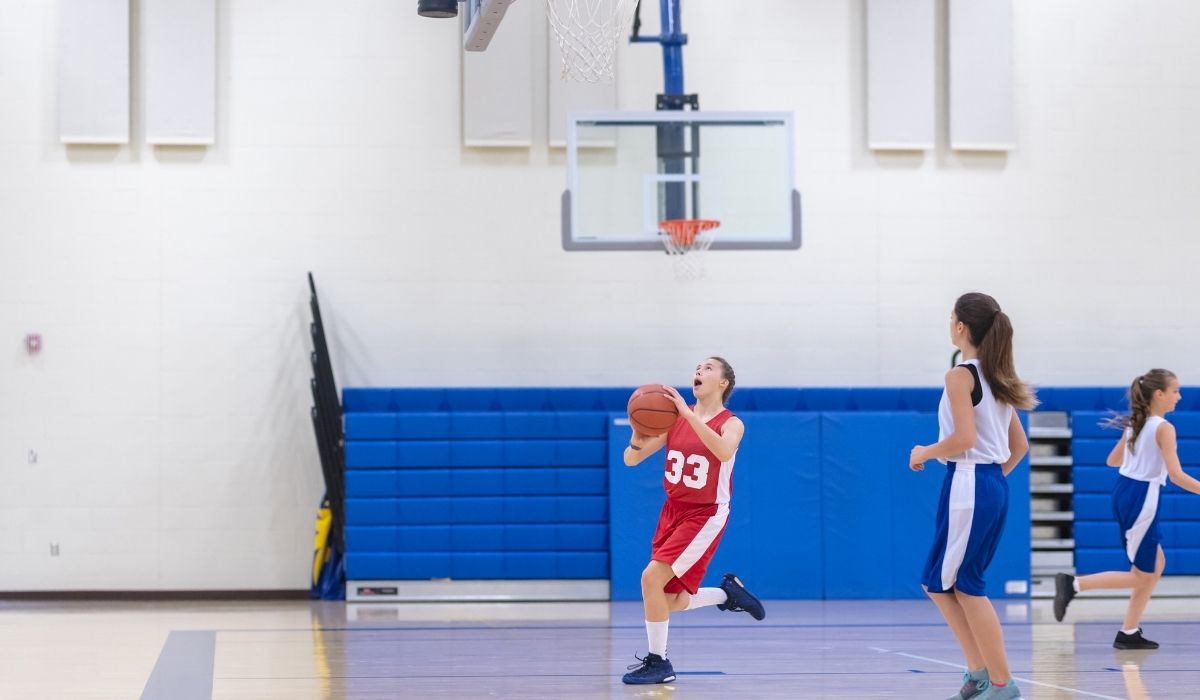20 Best Self Esteem Activities For Teen Girls

Self Esteem activities for teen girls is an important topic for every parent to consider. The reason is teenage life is one of the most crucial stages of growth for an individual. During these years, the life of a teenage girl seems to be challenging and changing constantly.
They gain exposure to different kinds of social situations, activities, hobbies, ideas, and even people that eventually affect the development of their personality.
During this period of growth, girls and boys also form physical, emotional, and cognitive skills, of which self-esteem is a huge part. Healthy self-esteem can significantly impact an individual’s mental health, well-being, motivation, and even the overall quality of life.
Although self-esteem is generally viewed positively, it can prove to be problematic when it is too high or too low. What a balanced self-esteem level looks like may differ according to individual perspectives.
FYI, it is common to struggle with low self-esteem during early adolescence. Research shows that about 70% of girls between the ages of 15 to 17 years avoid daily activities such as attending school when they feel bad about their appearance.
Teenage girls with low self-esteem are more likely to miss classes, do poorly in school, or even get pregnant. Moreover, low self-esteem can also cause mental health disorders like depression, generalized anxiety, and sometimes, eating disorders in girls.
So what are the activities that you can do to improve your self-esteem? Keep reading to find out the best self-esteem activities for teen girls!

What is Self Esteem?
According to the psychological viewpoint, self-esteem can define an individual’s subjective sense of self-worth or how much they value themselves. In simpler words, self-esteem can be viewed as how much one appreciates and likes themself regardless of the situations or events that take place in their life.
A few other terms often used interchangeably with self-esteem are self-worth, self-respect, or self-regard. We consider many factors when taking into account the self-esteem of a person. Some of these are:
- Competence
- Self-confidence
- Level of security as an individual
- Identity
- A sense of belonging
In regards to psychological research on self-esteem, it has been found that self-esteem tends to be lowest during childhood and increases in time during adolescence and adulthood, eventually becoming reasonably stable. Hence, we can include it in the category of personality traits that remain stable to a certain extent.
Self-esteem impacts the essential processes of life, such as decision-making, forming social relationships, and over well-being as girls. It also affects motivation because girls who hold a positive and fairly healthy view of themselves are more likely to realize their potential and bravely face challenges.
Some common traits that are viewed in teenage girls with a healthy level of self-esteem are:
- They have a firm realization and understanding of their skills and values.
- They can form and maintain healthy relationships because they have a healthy perspective of themselves.
- They set realistic expectations for themselves and their abilities to work towards achieving their goals.
- They can determine their needs and wants and openly express them to other people.
What causes low self-esteem in teens?
Any person with low self-esteem is prone to feelings of insecurity regarding their abilities and decision-making skills. They may also feel less motivated to try out new tasks or take up new challenges and may even believe themselves to be less than individuals with healthy self-esteem.
They may not trust their ability to reach goals they have set for themselves and may struggle with maintaining or forming social relationships as they fail to express their needs openly. All of this may add to feelings of low self-confidence and unworthiness.
Teenage girls with low self-esteem often face body image issues that can take severe forms in the future. Many factors can contribute to low self-esteem in teenagers, which can be seen in both teenage girls and boys.
Here are four factors that researchers mainly focus upon:
Appearance
During teen years, adolescents prescribe great importance to looking attractive and appealing. Most teenagers seem to be only concerned about their appearance, even if it’s only to a small degree. In most cases, one cannot drastically change their appearance in a few days; this can majorly contribute to self-esteem issues in teenage girls.
Teenage girls are also most susceptible to body image issues, with overweight teens greatly concerned about losing weight. At the same time, others too struggle to meet the beauty standards set by society, leading them to have a negative self-image and trouble coping with societal norms.
Friends/ Social Circle

A teenager’s social circle depends hugely upon their peers. During this age, teenagers tend to seek approval from their friends and be accepted by them rather than seeking parents’ support.
If a teenager feels like an outcast or does not gain their peers’ approval, it negatively impacts their self-worth. Some teenagers may also put others down or even make fun of their counterparts, affecting the adolescent’s self-worth.
Parents
It is common for teenagers to feel misunderstood and unheard of by their parents during adolescence. This does not necessarily mean that the parent is at fault, but sometimes parents or authority figures put teens down by speaking to them in a bad tone or even being disrespectful.
Criticism, if not put politely, can cause immense damage to a teenager’s self-regard, especially to teenage girls’ self-esteem since they seem to attach it to their appearance more than teenage boys. This can make them feel like they are not good enough for their parents or teacher. They may also feel like they’re not valued at anything, and it can make them feel unloved!
Unrealistic Expectations
Feeling the pressure of soon turning into a young adult, teenagers may set unrealistic expectations for themselves. Don’t get us wrong; we understand that we all need to reach our full potential and achieve great things in life. However, setting unrealistic goals and expectations that are tough to realize does more harm than good, especially for a teenager’s self-esteem.
If parents or teachers set unrealistic expectations for a teenager, they may feel inferior when they cannot meet these expectations. Teenagers can be pretty critical of themself, so it is vital to make them feel loved and appreciated.
Trauma or Abuse

Any form of trauma or abuse that a teenager has experienced can affect their ability to view themselves as worthy. In cases like these, it is of utmost importance to be sensitive to teenagers’ feelings and respect their boundaries.
How do you know if your teen has low self-esteem?
While low self-esteem is relatively common in teenagers, its impact is often undermined. Low self-esteem leads teens to worry excessively, causing issues with their mental health and making them feel ‘on edge’ at all times. While help is available for these teenagers, here are a few signs you must take into account if you think your teenager has low self-esteem:
Avoidance
If your teenager avoids new opportunities or new challenges, it may signify that they are struggling with low self-esteem. They avoid these challenges or opportunities because they feel like they’re not going to overcome or achieve anything. For instance, your teenage daughter seems to avoid participating in the school cheerleading squad, even though she has the talent for it.
Feeling unloved or unwanted.
Notice your teenager’s behavior. Do they say or do things that make you think they don’t feel loved? Do they talk about themself in a demeaning manner? If yes, this is a sign of low self-esteem that you must not ignore. Your daughter may say something like, “But no one loves me anyway” or “I don’t feel like I belong..” as a sign of low self-esteem.
Playing the ‘Blame Game’
When your teenager refuses to take responsibility for their actions and blame other people for the consequences, their behavior is a sign of low self-esteem. When your teenage daughter or son seems to blame each other for their mistakes, it may be viewed as a sign of low self-esteem.
Not able to deal with frustration
When facing personal or academic pressures, teenagers may ‘act out’ or be irritated and annoyed at all times. This is an unhealthy way of coping with an average level of frustration and can point towards self-esteem issues your teenager might be going through.
Comparison with others
“Comparison is a thief of joy.”
To put it simply, if your teenager seems to be excessively comparing their achievements to those of others, it may harm their self-image. They often undermine their achievements while speaking highly of others.
For example, your teenage daughter says something like, “all my friends are prettier than me.” Unnecessary comparison at this age can extremely negatively impact young girls’ self-esteem.
Fear of failure

Failure teaches you lessons, but this seems easier said than done when you’re a teenager. When adolescents fear failure, they limit their exposure to new opportunities, failing to find their true potential. This limitation also prevents a boost in self-esteem after achieving things or overcoming challenges in life.
They cannot take compliments.
If your teenager gets awkward or uncomfortable when someone compliments them, this may be telling about their self-esteem.
On the other hand, a teenager with healthy self-esteem will know how to accept compliments. Moreover, they will be further motivated to do bigger things and accomplish bigger goals they may have set for themselves, as compliments boost their self-confidence. This sign is more likely to be seen in teenage girls than boys.
Low levels of interest
Teenagers who show low interest or motivation to try out new hobbies or take up new challenges may lack self-esteem. They often seem disinterested because they believe in not being able to do things well, which in turn leads to lesser motivation.
The signs mentioned above may be telling of low self-esteem in teenagers. As a parent, look out for them and try to communicate with your teenager to help them cope with it.
Long term effects of low self-esteem in your Teen
Individuals with low self-esteem avoid social situations, fear failure or embarrassment, and may face trouble in many spheres of their lives. Low self-esteem can have long-term effects on an individual if left unidentified and untreated. Some of these are:
1. Difficulty in making friends or forming relationships
Low self-esteem can impact the friendships and relationships that a person has. According to research, it can also affect personal relationships and distort teenagers’ views of their romantic partners. Self-defeating thoughts and patterns can affect how you view your relationships, causing trouble maintaining them.
Low self-esteem can build communication barriers as the individual cannot openly express their feelings or emotions in the friendship or relationship as a teenager.
2. Heightened negative emotions
Nothing is worse than getting caught in a vicious circle of negative thoughts. When one experiences low self-esteem, they may experience even more negative emotions such as excessive anxiety or anger as they have a low sense of self-worth. These emotions often give rise to other negative emotions, such as feelings of embarrassment or irritability.
3. Low motivation

Low self-esteem makes people less confident in themselves, leading to lowered interest and motivation. Individuals with low motivation are often less productive. When a person is motivated, they often have positive thoughts about achieving a particular goal or motive. This is rare or even absent in individuals with low self-esteem, thus causing them to seem ‘lazier’ or ‘less productive.’
4. Poor Body Image
Parents play a critical role in teenagers’ perception of their bodies. If adolescents have a flawed perception of themselves, it can lead to a poor perception of their bodies. It may be difficult for teenagers to achieve the ‘ideal’ body as portrayed in the media.
According to research, “A girl’s self-esteem is more strongly related to how she views her own body shape and body weight than how much she actually weighs.”
5. Earlier sexual activity
It is easy to fall prey to unrealistic standards of sex and body, as shown in the media. Teenagers, especially young girls with low self-esteem, are more likely to engage in risky sexual behaviors. While the relationship between sexual activity and self-esteem may differ according to gender, teenage girls with low self-esteem are most likely to engage in careless sexual practices.
6. Alcohol or drug abuse

People are usually more confident when under the influence of alcohol or drugs. Self-esteem is an essential variable in studies of alcohol and drug abuse, prostitution, or even theft.
In one study, around 75% of girls with low self-esteem compared with 25% of their counterparts with high self-esteem were more likely to engage in harmful behaviors like cutting, bullying, and excessive drinking or smoking.
How can you teach self-esteem to teens?
While low self-esteem can have more significant negative impacts on a teenager, there are ways to prevent this from happening by making sure you teach your teens self-esteem right from the start. Self-esteem starts to develop right from the age of 3. No matter how small, every achievement or failure may contribute to the person’s self-esteem.
Every person is different and unique. For some, healthy self-esteem comes easily, while some may struggle because they’re facing things we never get to know. These individuals may require a little push and help to realize and raise their low self-esteem and worthiness.
Here’s what you can do to teach your teen to have healthy self-esteem
Help your child learn.
At every age, there is a lot for children to learn. From being a baby and taking their first steps to a teenager, they may need to learn things like coping with social situations or maintaining relationships.
When you help your teenager learn such things and be independent, their self-esteem grows, which allows them to have a positive image of themselves. Something as simple as putting together a treehouse on its own can have a big impact on a teen’s self-esteem.
Model the things you want them to learn
Be a practitioner of everything you’re trying to teach your kid. Children often look up to their parents to learn how to behave or act. Be mindful of how you conduct yourself in their presence.
When teaching your teenager new things, initially, you might want to show them how these things are done. They will soon gain the confidence to do these tasks independently with time and practice. Please make sure the tasks you let your child complete are not too easy or too difficult for them to do.
Don’t be hesitant to praise your child when needed
It’s a good thing to show appreciation and how proud you are of your kid for doing things on their own. However, some things must be kept in mind while praising a child.
- Don’t go overboard
Praise feels good when it is earned. For instance, if your kid performs poorly on a test and is aware of it, it may backfire if you say something like ‘I’m proud of you for doing good on your test’ as it may seem fake.
On the other hand, say something like ‘I know this wasn’t your best, we all have bad days. I’m proud of you for not giving up.” Show some confidence in your child by adding something as simple as “We can always try harder the next time.”
These genuine praises will motivate them while at the same time assuring them that their efforts are recognized. This is very important for teens, as during this time, the approval of parents plays a big role in their lives.
- Praise and recognize the effort.
Don’t focus only on the result. When praising a teenager, it is more important to appreciate the hard work and effort they must have put in.
Chances are, they already know the result they got was not what they had hoped for. In cases like these, one must be kind and polite to the child and praise their progress instead of the outcome.
For example, say things such as “I see you’re working hard on your project” or “I’m proud of you for going swimming every day; I can tell you’re getting better at it every day.”. This also motivates the teen to try harder and work towards achieving their goals, eventually leading them to success.
Maintain the right attitude

When performing tasks in front of your teen, make sure you do them with care and effort to be a good role model for kids. Doing your tasks without complaining or grumbling about them can greatly impact the teen as they may learn to do the same. Remember, you are responsible for teaching your teenager by modeling the right attitude when doing daily tasks.
Don’t be overly critical or harsh.
It is so important to be mindful of what you tell a teen. Teenagers are often going through many changes during this period in their lives, and every harsh conversation can be overwhelming. When you talk to your teenager politely and with respect, it helps them build a good perspective about themselves.
In contrast, when you speak harshly or severely criticize them, it may lower their self-esteem. If the person has made a mistake, correct them with patience. Focus more on how you want them to act the next time the same situation occurs rather than focusing on how you can punish them for the mistake they’ve made this time.
Whenever required, you can also show them how things are done correctly instead of harshly criticizing or yelling at them.
Focus more on the positives
Pay great attention to detail about teens when turning into young adults. Make sure you know their strengths and weaknesses and don’t make them feel bad for having some vice. Focus more on the virtues of the teenager and help further strengthen them.
If you notice that your teen is kind, reinforce the behavior, don’t shut it down or criticize them for it. This will motivate your teen to be on their excellent behaviors more often and even help them feel good about themselves.
Promote values of being helpful and giving
If your teen is capable of helping others, let them. Self-esteem grows when teenagers realize that their actions have good consequences.
If your teen is willing to help out at home by doing some chores or if they want to help their sibling complete a school project, let them. This will help the person feel valued, loved and will contribute greatly towards building their self-esteem.
How can you build self-esteem in teenage girls?
In the toxic culture and the digital age we’re currently living in, it gets tough to maintain a sense of self-esteem, especially for young girls. The ‘ideal’ beauty standards seem to be fluctuating, causing many self-esteem issues in young teenagers.
According to experts Catherine Steiner-Adair, EdD and Anea Bogue, MA and Mary Rooney, Ph.D. here are some ways in which you can help raise your teenage daughter’s self-esteem:
1. Model acceptance
When you fully accept your body and yourself, you can model this behavior for your daughter. Don’t ask yourself or your daughter things like, “Do I look fat in these jeans?”. Make sure you maintain a healthy relationship with food and model the same for your teen.
2. Make sure she understands the difference between ‘real’ and ‘filtered’ beauty
In the digital era of beauty filters, it may get difficult to understand the difference between real and filtered. These filters often distort the teen’s perception, making them feel like there’s something ‘wrong’ in the way they look naturally, without the filter. Make sure you let your teen know that she is beautiful with or without the filters.
3. Don’t raise her to be a ‘people pleaser’
A pleaser is someone that looks to other people for validation. The problem is that girls who grow up as people-pleasers often fail to put themselves first while making important decisions. Let your girl know that she shouldn’t come second to anyone!
4. Help build team spirit

Starting early is good for helping your teen ingrain a feeling of belongingness to a team. According to studies, girls that play team sports tend to have higher self-esteem when compared to those that don’t.
5. Make sure you praise her for things other than just appearance
There must be a balance between compliments given to a girl based on:
- her appearance,
- work ethic,
- and who she is as a person in this world.
This will help your teen not depend entirely on their appearance when it comes to having healthy self-esteem.
Teen self-esteem activities
Self-esteem in teens can be boosted by using several techniques or conducting fun activities with them.
Here is a list of twenty activities that will help boost your teen’s self-esteem:
1. Certificate of Achievements
Motive: This activity will help teenagers realize their past, present, and future achievements. In turn, they will gain confidence in achieving new things and overcoming new challenges.
How:
- Ask your teen to take one sheet of paper and divide it into three sections, past, present, and future.
- Ask them to fill in their achievements as per the time frames.
- Paste this sheet somewhere in the house where it is randomly visible.
This will be like a reminder of their achievements, always being present to support their self-esteem.
2. Positive affirmations
Motive: This activity will encourage a positive attitude and focus, and it will also help boost self-esteem and confidence.
How: Give your teen one specific day and ask them to speak positive affirmations to themself all day long. Tell them to talk to family members about their positive qualities and things they like about themselves.
3. Sentence Completion
Motive: By doing this activity, your teen will learn to recognize and understand their emotions and feelings while helping you do the same. Self-awareness is the first step towards self-progress.
How: On a sheet, write down open-ended questions like ‘In the near future…’ or ‘I struggle a lot with…’ and ask your teen to fill the rest. Conduct this activity every few weeks, and make sure you keep the sheets. You can later compare these sheets to help your teen realize their progress.
4. Gratitude Journal
Motive: Maintaining a gratitude journal can help a person keep track of daily events, triggers, or other emotions.
How: Instruct your teen to record at least two things they are grateful for in their life each day. You can start with two and later instruct them to increase the number of items. At the end of every two weeks or so, compare the records.
5. Negative Core Belief
Motive: This activity will help recognize negative self-talk and spring clean any wrong or false beliefs that your teen might be carrying about themself.
How:
- Ask your teen to identify three negative core beliefs about themself.
- Ask them to give three reasons why each of these beliefs may be false.
- Ask them to write these down and look at them each time the negative thought seems to pop up in their head.
As your teen starts performing these activities, you will notice the gradual change in their self-esteem and confidence.
6. Volunteering
Motive: This activity will help your teenager feel like they belong and have a purpose.
How: Get your child to volunteer for any form of NGO to help out those in need. If you think this is a big responsibility to put on a teenager, you may even help them do small deeds such as helping a friend out with their homework to boost self-esteem.
7. Practice Forgiveness
Motive: This activity aims to help your child understand that everyone makes mistakes, and it is okay to make them as long as you learn from them.
How: Ask your child to confess one mistake they have made that they might regret or are embarrassed about. Ask them to write this mistake on a piece of paper and then tear it. In a way, this may help them let these regrets go with a realization. Teach your child to let go of their past.
8. Perspective
Motive: Perspective is a group activity that helps teens understand that one situation can be interpreted differently by different people and that they must have faith in their version of things or events.
How: Make the teens sit in a circle and hand each a piece of paper. Ask them to fold the piece of paper three times and then cut a circle in the center of it.
After the activity, almost no one will have a circle cut at the center of the paper, and some may even have two circles. Then, make the teens understand that their perspectives of situations or events can be different. They should also believe that ‘different‘ doesn’t necessarily mean wrong, and they must stay open to curiosity.
9. Change your story
Motive: To help teens understand a teenager’s shared struggles
How: Make the participants form a circle and write down the first line of any horrible incident that has happened in the past. Then ask them to pass the paper around and let everyone take turns writing about what they think must have happened next.
In the end, when the paper is back to the owner of these incidents, ask them to read the story and then dictate what actually happened. This will build a sense of community and also help teenagers realize that a lot of the struggles that they go through are shared struggles.
10. Superhero
Motive: To boost self-esteem in teenagers and help them feel empowered.
How: In a circle, every individual talks about their favorite superhero or character from any show/ series. Along with it, one superpower/ feature the teenager thinks the character and them share in common.
Routine actions and games can also help boost self-esteem, according to experts. There are fun and straightforward ways to boost your teen’s self-esteem. Some of these can take the form of games like:
11. Catch the Compliment
In this game, the players are instructed to be seated in a circle. A ball is given to the people involved, and they are instructed to throw the ball randomly to any other person in the circle.
The person throwing the ball must compliment the person catching it. This game involves more than two/ three people and works well when played in groups.
12. Round Robin
The participants are instructed to sit in a circle. The host starts a random story and goes around the circle, asking the participants to add to it. The story might take funny or silly turns. To help participants, you may even add cue cards with prompts.
13. Totika Self Esteem Game
Totika is a game similar to Jenga but with the addition of cards. The blocks of Totika are colorful, corresponding to categories of the cards, which consist of questions. The cards have been designed in a way to boost self-esteem and confidence.
14. Rolling in Admiration
This game is similar to ‘Catch the Compliment.’ Participants sit in a circle and will roll dice on their respective turns. The number on the die will determine the number of compliments the person will give to the person sitting next to them.
15. Scavenger Hunts
Scavenger hunts, also known as treasure hunts, have been played for a long time to boost confidence and provide a sense of achievement. These games also build curiosity in the participants.
Participants are given specific things or clues about something they need to find and are instructed to solve the clues and complete the hunt.
16. ‘I am…
This is a simple game. You need a cutout of your teen’s face, then ask your teen to write positive adjectives about themself on the cutout. Then, tell them to stick this cutout in their room to reinforce positive self-belief.
17. Tower of Self Esteem
The Tower of Self Esteem is a therapy card game. Counselors and child psychologists have specially designed it.
This game consists of colored cards put together by the tower of self-esteem, metaphorically speaking. The cards are question cards and must be answered by the participants before they put them as a block for the tower.
18. Totem
Totem is another game specially designed by mental health professionals to boost confidence and self-esteem in children and teens. Players use cards to reveal the others’ strengths and positive qualities by forming totems.
These cards also include a few animal cards combined with the other cards. Each player then gives one quality card and one animal card to another player to add to their totem. The game ends when every player has their complete totem.
19. You Know Social Skills Game
‘You know’ is another specially designed card game that helps boost self-confidence and social skills in teens. The cards can be used to present situations for rapport-building and promote positive relationships.
The game is based on Cognitive Behavioral Therapy, often employed by therapists and other mental health professionals for dealing with mental health issues of children and teens.
20. Art Wall
This is an easy way to promote self-confidence and self-esteem in adolescents. Similar to the “Certificate of achievements” activity, this game can be called the “wall of achievements.”
This game differs because instead of writing achievements, the teens can draw and/or paint their interests, passions, or anything positive they wish to. The aim is to help the teen reflect on positive instances in their life and be reminded of their self-worth.
In Conclusion
Playing these games and doing these activities will help your teen realize the importance of healthy competition. It will also instill sportsmanship and help them gain skills that develop a teenager’s personality. The main goal of these activities is to make individuals more confident and boost their self-esteem to a healthy level.
Research shows that every 7 in 10 girls are not satisfied with how they look or feel like they’re not good enough in some way or the other. It is challenging for teenage girls to have a positive self-image owing to today’s social media standards.
Positive views about oneself give one the confidence to achieve great things in life. So make sure your teenager has the self-esteem and motivation to do these great things, and even if they don’t, make sure to tell them you’re proud of their efforts regardless!
Save This For Later!

